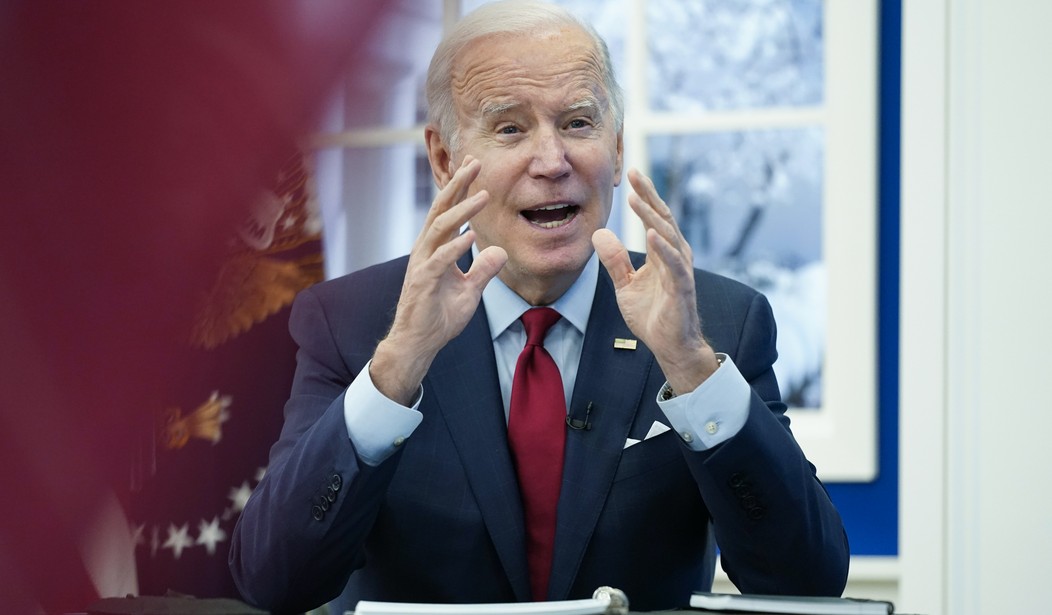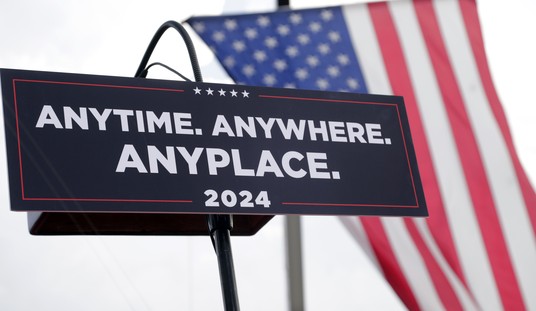Don’t get your hopes up, because this advice isn’t quite what it sounds like. Joe Biden’s former COVID-19 advisers have begun a public campaign to get the White House to end the “perpetual state of emergency” that the Biden administration keeps extending. It’s time to dump “zero COVID” for a practical path forward on endemicity, they say … but is that what they’re proposing?
The New York Times covered this as breaking news of a sort, but the real point of these proposals is to enshrine the emergency state into permanence:
On the day President Biden was inaugurated, the advisory board of health experts who counseled him during the presidential transition officially ceased to exist. But its members have quietly continued to meet regularly over Zoom, their conversations often turning to frustration with Mr. Biden’s coronavirus response.
Now, six of these former advisers have gone public with an extraordinary, albeit polite, critique — and a plea to be heard. In three opinion articles published on Thursday in the Journal of the American Medical Association, they are calling for Mr. Biden to adopt an entirely new pandemic strategy — one that is geared to the “new normal” of living with the virus indefinitely, not to wiping it out.
The authors are all big names in American medicine; several, including Dr. Luciana Borio, a former acting chief scientist at the Food and Drug Administration, have held high-ranking positions in government. The driving force behind the articles is Dr. Ezekiel Emanuel, an oncologist, medical ethicist and University of Pennsylvania professor who advised former President Barack Obama.
They say the first thing the administration needs to do is to step back and take a broader vision, by recognizing that Covid-19 is here to stay.
If that sounds good, the strategies for their vision of a “new normal” may not sound as palatable, and Joe Biden’s reluctance to embrace their vision a bit more understandable. Vaccinations and readily available therapeutics will make a transition away from “zero COVID” strategies possible, they argue in separate essays at the Journal of American Medical Association, but they also want comprehensive viral surveillance and centralized real-time data collection as well:
First, the CDC needs to collect and disseminate accurate real-time, population-based incidence data on COVID-19 and all viral respiratory illnesses. The US should not be reliant on extrapolating cases and outcomes from data collected from a few, underrepresentative sites. The country needs a comprehensive testing and reporting system for all viral respiratory illnesses. Data from all medical and testing facilities, all emergency department cases, and all hospitalizations, ICU admissions, and deaths need to be reported to the CDC and linked to anonymized sociodemographic, vaccination, and clinical outcomes data. The reporting system should accommodate the ability to incorporate data from at-home tests, ensuring a simple mechanism to self-report results, and should provide real-time reporting on a public website. …
The recent emergence of the Omicron variant has highlighted the need for a comprehensive, nationwide environmental surveillance system that includes wastewater and air sampling to monitor for potential outbreaks of viral and bacterial illnesses. Traditional surveillance systems are highly reactive. By the time a health system or laboratory detects and reports a concerning pathogen or variant, it is too late to contain its spread. Great progress has been made toward establishing environmental surveillance programs for SARS-CoV-2, but there is a need to rapidly expand to other pathogens and reach rural and other communities that lack wastewater systems. A comprehensive national system is needed to reach the full potential of this surveillance approach, which should empower local jurisdictions with rapid, actionable data and transform pandemic prevention into a more equitable and proactive practice.
That comes down to individual surveillance too, albeit quasi-optional:
The US needs to establish a real-time, opt-out digital surveillance system to monitor all vaccinated individuals for the frequency and severity of adverse effects, postvaccination infections, and waning immunity. Two years into the pandemic, the US is still heavily reliant on data from Israel and the UK for assessing the effectiveness and durability of COVID-19 vaccines and rate of vaccine breakthrough infections. In addition, when the definition of “fully vaccinated” shifts to 3 doses (or perhaps more doses) of mRNA vaccine, the US lacks a reliable way of identifying who has received only the first 2 doses and who has received a third dose.
That doesn’t sounds too normal-ish to me, nor will it to most Americans. The last part seems especially troublesome from a privacy and liberty standpoint. In the first place, the government itself turned out to be a bigger obstacle to boosters than any other factor, diddling around for weeks on the idea and then slow-rolling access for another few months.
The basis for this intrusive and arguably unnecessary regime is quite the opposite of the “live with COVID” mentality; it argues for a “perpetual state of emergency” mindset. This paper stresses that the endurance of vaccines and naturally acquired immunity isn’t yet known but assumes they won’t last long. It’s not entirely clear what the basis for that assumption is yet since the booster shots already given appear to be durable enough so far. On top of that, this paper evades the point that effectively vaccinated people transmit both Delta and especially Omicron, so vaccination isn’t really a strategy against community transmission with these variants and likely any others that emerge that would have to compete against Omicron. If that’s the case, then it’s not really the business of government to track everyone’s vaccination status and exposure, which would require a Big Brother-esque surveillance state that might end up getting abused for more malignant purposes.
In fact, as the New York Times points out, the proposals here advise that we should put all respiratory infections into the COVID category to make it easier to launch emergency measures:
Dr. Emanuel, Dr. Bright and Dr. Borio write that the first step toward the “new normal” requires recognizing that the coronavirus is one of several respiratory viruses circulating, including influenza.
The authors write that policymakers should “retire previous public health categorizations” and “focus on a new category: the aggregate risk of all respiratory infections.” The nation, they said, needs to figure out how much hospitalization and death will overload health care systems, and then use that metric to trigger emergency measures.
Alternately, we could just build more hospital capacity, and with that idea implement policies that incentivize health care workers rather than punish them. This is a typical shortage mentality at work, in this case justifying authoritarian policies in a “perpetual state of emergency.” What administration would fail to trigger such an emergency declaration and run the political risk of even the death rate in a normal flu season?
This is a recipe for indefinite authoritarianism, not normalcy. Normalcy would involve making as many tests, vaccines, therapeutics, and other health-care resources as plentiful as possible and rely on people to care for themselves properly. We’ve done it for a century with the flu and other respiratory diseases, and now the tools have caught up with the novel disease introduced two years ago. Let’s bet on freedom and see where that takes us, because this path will lead us permanently away from it.








Join the conversation as a VIP Member